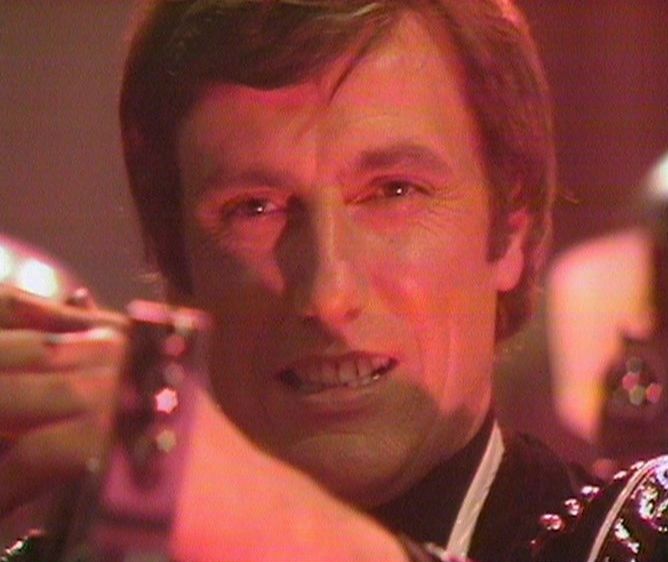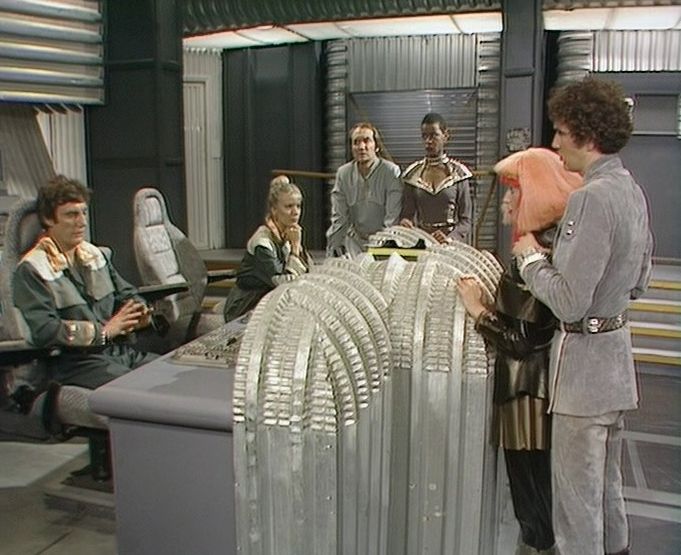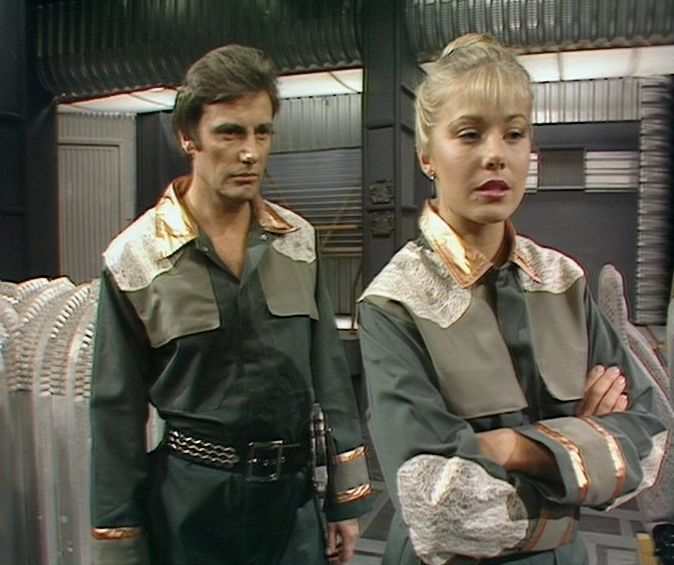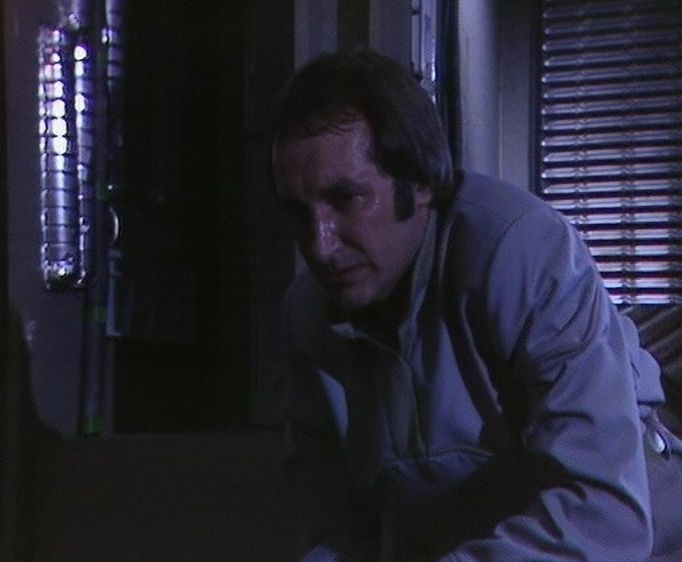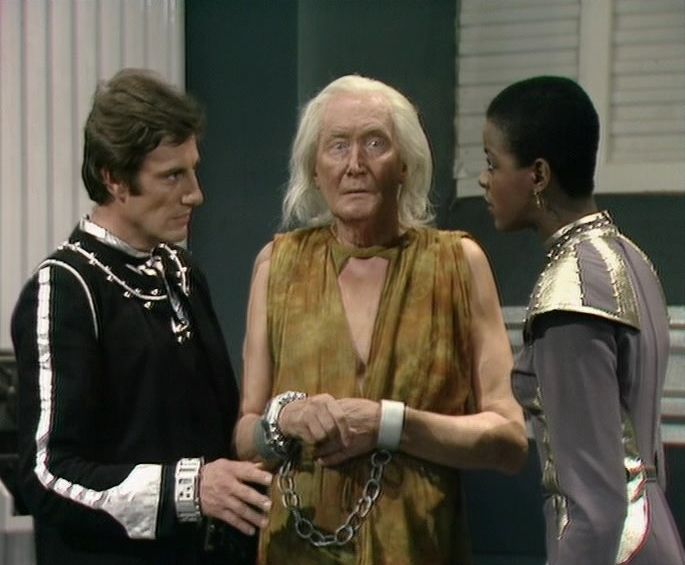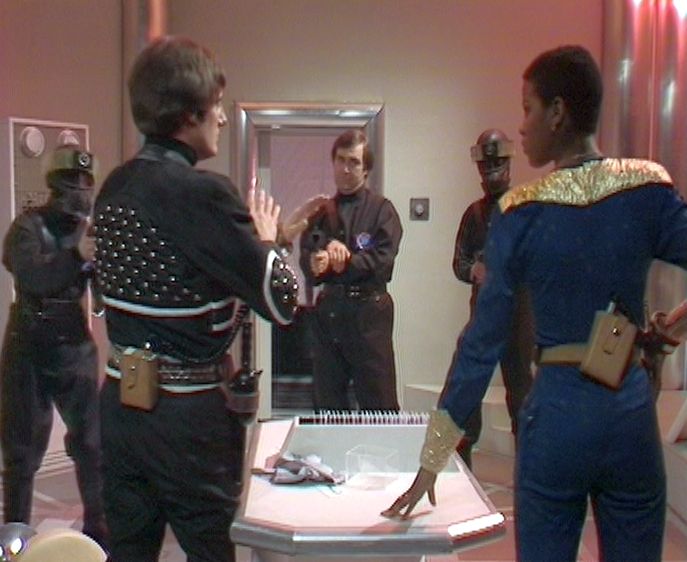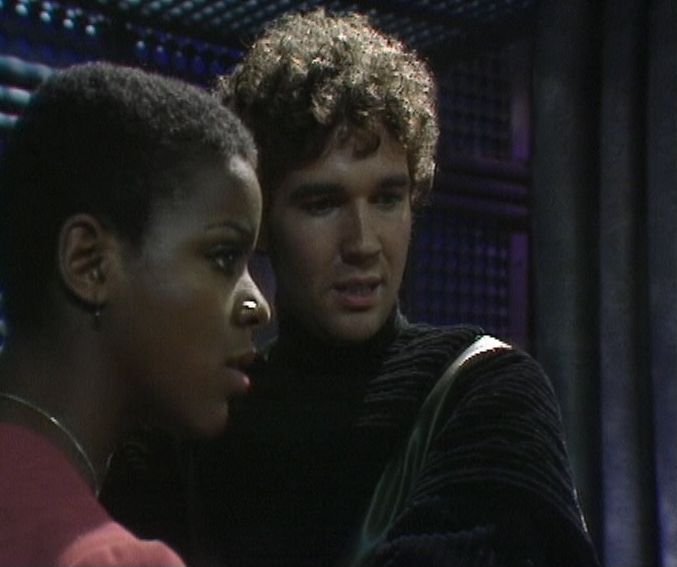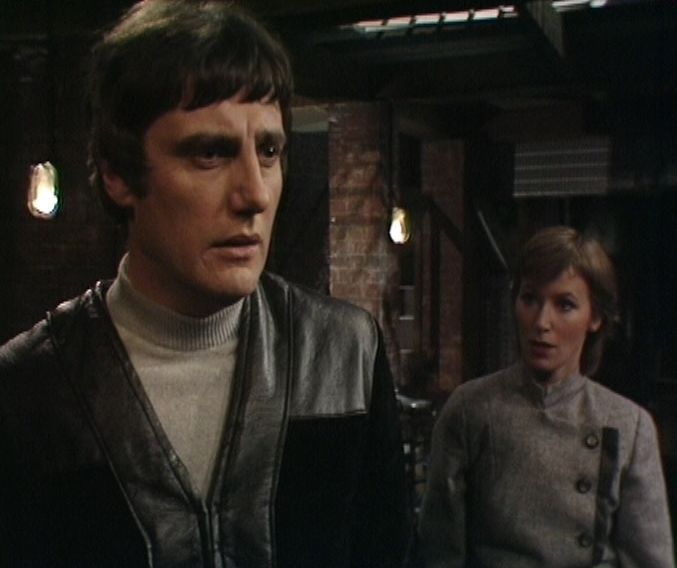
The opening of Blake, following on from the events of Warlord, finds Avon and the others at a low ebb. They’ve been forced to destroy their base at Xenon, due to fears that either Zukan or one of the other members of their recent meeting might have betrayed its location to the Federation.
This rather begs the question as to why Avon decided to hold the meeting there, but by now it should be fairly clear that he’s not operating in the most rational manner. He explains that the death of Zukan leaves them with a problem – they need to find another figurehead to lead their attack against the Federation. This doesn’t quite tie back to the events seen in Warlord though as whilst Avon was keen to use Zukan, it wasn’t as a unifying leader.
No matter, it’s only a slight continuity error and it does neatly explain why Avon’s suddenly decided to track down Blake after all this time. He explains to the others that Blake “is strongly identified with rebels, you see, and very popular with rabbles. They will follow him, and he will fight to the last drop of their blood.”
Blake’s apparently on Gauda Prime, a totally lawless planet which has recently made an application to restore its former legal status. In order to do this they need to ensure that all criminals are caught as quickly as possible. And this is Blake’s job. As improbable as it sounds, Blake’s working as a bounty hunter.
Our first sight of Blake is an arresting one. Viewed from the side he appears to be the same man that we’d seen at the end of series two, but it’s only when he turns to face the camera that the wicked scar running down the right hand side of his face is visible. It’s never explained how he came by this, but it’s clear that the last few years haven’t been easy for him. Gareth Thomas instantly commands the screen as an older, wearier, bitterer Blake, seemingly reduced to catching criminals for money.
Humour is in short supply in this story, but I like the squabble between Orac and Slave, which sees Orac exasperated that Slave would have the temerity to interrupt him. After a few minutes, Slave sounds the alarm and after everyone’s rushed about for a few seconds he admits that there’s no danger, he simply wanted to get their attention! This moment of amusement doesn’t last long as Scorpio then really does come under attack and the painful descent to Gauda Prime begins.

They all throw themselves around the set with abandon whilst fairly feeble explosions go off. It all looks a little half-hearted, but once everybody except Tarrant has teleported to the surface the fun can really begin. That’s when the ship is comprehensively destroyed and Slave speaks his final words. If the model shot of Scorpio crashing through the trees looks a little underwhelming, then the full size destruction of the ship is impressively done.
If Blake has a problem then it’s the fact that nothing much really happens for the first forty five minutes. Everything’s geared up for the meeting between Blake and Avon, meaning that everything else is just preamble – apart for one important revelation. Blake captures Tarrant and manages to convince him that he’s a fearsome bounty hunter, but it’s all a sham, revealed in this conversation between Blake and Deva (David Collings).
DEVA: These stupid games you insist on playing, Blake, will get someone killed eventually.
BLAKE: I have to test each one myself.
DEVA: No, you don’t have to! I set up systems for that. I broke the security codes on their central computer. I got us access to official channels, information, everything we could possibly need! You don’t need to be involved at all.
BLAKE: All right, I find it difficult to trust. It’s a failing, I admit!
DEVA: And any one of our people could select the people you’ve collected. You don’t need to do the bounty hunter routine, either!
BLAKE: Indulge me.
DEVA: Do I have a choice?
BLAKE: Oh, there’s always a choice, Deva.
If some of Avon’s recent behaviour has been bizarre, then so is this. Blake couldn’t foresee that Avon wouldn’t listen to reason when they met up, but Deva was quite right when he told Blake that he was playing a dangerous game. This part of the story doesn’t quite hold water anyway – we assume that Blake is recruiting an army from the criminals on Gauda Prime to fight the Federation. But is picking the scum of the earth (a group of lawless murderers) really the wisest choice? Why isn’t he going from planet to planet, inciting rebellion? This begs another question (sadly unanswered), namely is Blake’s scar as fake as his bounty hunter story?
The fact that he doesn’t even have to be there at all – he’s simply playing games – is bizarre. And pretending to Tarrant that he’s prepared to turn them all over to the Federation proves to be a fatal mistake. Tarrant rushes over to tell Avon (who has coincidentally just stepped through the door) which means that the reunion between Blake and Avon doesn’t quite end the way either of them hoped for.
Darrow’s delivery of the line “have you betrayed us? Have you betrayed me?” has come in for a little criticism over the years. True, he’s more than a little arch here, but in context it works if you accept this is now an Avon at total breaking point. As Avon repeatedly shoots Blake you can see a range of expressions play across Darrow’s face which indicate that Avon realises, almost as soon as he’s pulled the trigger, that he’s made a horrendous mistake. It’s a little too late though ….
Then all the others die (possibly) in slow motion. With the destruction of Scorpio and the entire crew seemingly dead, that would appear to have been a fairly final ending. But it’s always intrigued me that Gareth Thomas agreed to return only if Blake was shown to be 100% dead at the end – that way, he argued, he’d no longer have to worry that he’d lose parts due to people assuming he was still the star of Blakes 7. But if the series was coming to an end this makes no sense.
Was a fifth series on the cards? There’s always a way out – demonstrated by the oodles of fan fiction which states that the others weren’t really dead, they were merely stunned (even though we’ve never seen Federation guns set to stun in the series). True, we don’t see Avon die, but unless the guards were really poor shots it’s pretty much a certainty. And even though Blake appears to be very dead that can easily be explained away – it wasn’t Blake, it was his clone from Weapon. Of course ….
Whether you like to believe that they all lived to fight another day or that this really was the final end, Blake offers as uncompromising a conclusion to the series as you could possibly ever expect to see. It’s certainly worth sitting through the first forty five minutes for the final five.
